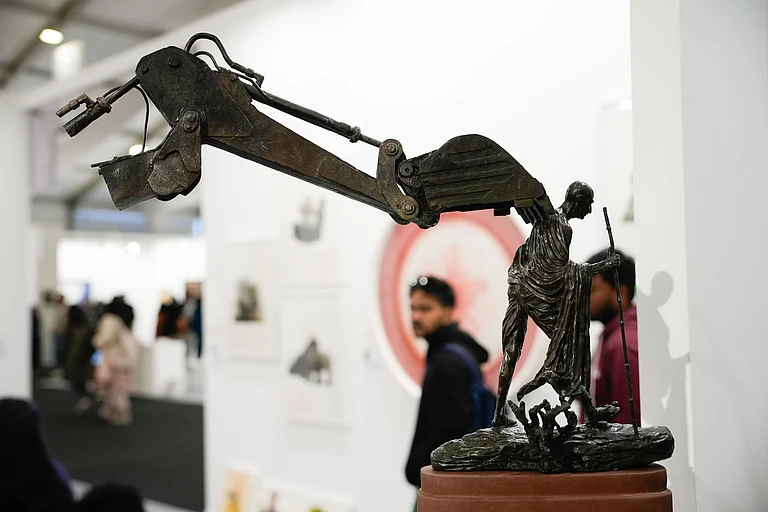Did the offer of a dialogue from Prime Minister Vajpayee, at the time he was in Srinagar, come as asurprise?
The fact that he spoke about it in Srinagar is a tacit admission that Kashmir is an issue between India andPakistan which needs to be tackled through a dialogue. I want to repeat it for Outlook readers, it's awelcome statement and a very positive development. It's far removed from the belligerent statements Indianministers have been making. Kashmir is an issue. If the Indian prime minister wants to discuss Kashmi, he isshowing realism and acting like a statesman.
The major problem arising out of this conflict is one of massive poverty. Unfortunately, irresponsibleleaders in both countries have tried to mislead their large populations who are not very politically consciousand therefore very gullible. I, for one, can say with some satisfaction that I have never indulged in suchrhetoric against India. My constituency in Kasur is located on the border. Some of its villages are oppositeFerozpur in India. Anti-India rhetoric would go down well there. But throughout my 30 years of politicalcareer I have refrained from indulging in anti-India rhetoric.
India and Pakistan must resolve all their outstanding disputes otherwise neither can eradicate poverty, norrealise their potential in these efforts to "cut each other down to size".
The Kashmir dispute is heading for some sort of a resolution in the intermediate future after Iraq. USpresident Bush and British prime minister Blair have shown commitment to the resolution of the Palestineproblem. Bush said rather dramatically that he will devote more time to Palestine as Blair has to NorthernIreland.
Terrorism is obviously the number one issue on the agenda of the west. They are more scared of this thanwar. In war you can identify the enemy. Against terrorism, there is no defense. Without admitting, the US andEurope know that the Muslim world is seething with anger because of injustices which they feel the West hasperpetuated against Islam. Palestine and Kashmir fall into this category. Once Palestine is resolved wherewill the international community focus next? Kashmir will be the next item on the calendars of all major worldpowers .
But was Vajpayee's offer a surprise?
Surprise? I won't say surprise. I as Foreign Minster adopted a policy to reduce tensions and did notrespond to provocative statements from India. I felt my response should be to contribute to lowering oftensions. In my small and humble way, some impact has been made. I am also aware of some friendly countrieswho have been very perturbed by the thought or possibility, however remote, of war between the two countriesleading to a nuclear exchange.
I want to recall here the European Union's resolution for resolving the Kashmir problem. A Security Councilresolution related to the 1998 nuclear detonation by both countries declared Kashmir as a major flashpoint.Kashmir was declared as the most dangerous place on earth by former President Bill Clinton.
During my last visit to the US everyone -- President, vice president, secretary of state, secretarydefense, national security advisor, attorney general, heads of house committees on South Asia, major thinktanks -- I met had the same message. Senator Joseph Liberman, who is the Democrat candidate for President,told me, "In my opinion the single greatest threat to American security is not Iraq (this was before theIraq war), but the threat of war between India and Pakistan."
Also important is the statement of the French Foreign Minister (Dominique de Villepin) that SouthAsia topped the list of the three most dangerous areas. If I know these facts, then the Indian Prime Minister knows more than this.
It is much better for India and Pakistan to behave in a mature manner and not do what is good for themunder foreign pressure. I do not want to use the word 'pressure' in a negative sense. We should be grateful tofriendly countries who are using their moral and political pressure for a dialogue.
What is so startling about all this?
Pakistan and India have had three wars. Pakistan realised that it could not achieve its objectives throughwar. If India has doubts, they should be removed. More recently, the "coercive diplomacy" translateditself into the largest mobilisation of troops in peace times since World War II. The subsequent withdrawalled the Indian army, the media and political parties to debate on the need for mobilisation and thenwithdrawing its troops. Additionally, India tried to put diplomatic pressure after 9/11. It was disappointed.President Pervez Musharraf, in a statesman-like move, joined the war against terrorism.
Again, India felt it had to isolate Pakistan during the Iraq war and some statements of its ministerstalked of a preemptive strike. But the reaction from Pakistan, the US and the UK, should be enough to convinceanyone that only a composite dialogue between the two can lead to a resolution of the Kashmir issue and otherproblems.
India says first all infiltration should stop before a dialogue can begin. Pakistan denies the charges.Is the script being written for yet another failure?
Let me put this in its proper context. Prime Minister Vajpayee's first statement in which he did notmention pre-conditions for talks was for the international community. When he talked about thesepre-conditions the next day, his comments were directed towards his home audience, specially the hardliners inthe BJP. I am optimistic and take what he said at face value. The prime minister of India has his heart in theright place but being a politician I hope he takes two steps forward and one step bac,k and not the other wayaround.
So what's the way out?
India says there is cross-border movement and Pakistan says that to seize this movement at the LOC, Indiahas deployed massive troops there. At the LOC alone it has 30,000 troops, which means that for every threemeters at the LOC there is one Indian soldier. If the Indian army cannot stop the infiltration, the only wayout is an objective test.
Pakistan is askingfor neutral monitoring on both sides of the LOC, to arrive at some judgement. I am surprised that senior andrespected writers like Kuldip Nayar took offence at this suggestion. Unfortunately, in his article he did notsuggest how else one could satisfy civil society in India that all acts of violence cannot be blamed onPakistan.
The only way out is for India to come with an open mind and agree for a composite dialogue without anypre-conditions. If Pakistan is not interested in talks with India, it could easily refer also to several humanright violations by Indian forces in Indian-held Kashmir.
So, will the talks fail as there is as yet no meeting ground?
I hope not. I would like to assure you that the current statements from the BJP leadership are for theirown domestic consumption because the stakes are very high. All men and women on both sides want both countriesto start a dialogue. The international community also wants that. The enlightened want and demand so. I hopeall these pressures will stop forces in both countries who wish to derail the commencement of a dialoguebetween them.
What about the role of the US? Have they furnished any guarantees to bring India to the table?
I think the US is an honest broker. There is no doubt that the US and Europe want this issue settled. TheUS has been very active in the last year. In my interactions with scores of foreign minister, I notice thatthe first thing on their mind is Kashmir, just as I'm sure when they meet the middle east foreign ministersthey talk of Palestine. Suffice to say that the US has played a very positive role.
Where does the process go from here after the phone diplomacy?
Well, people to people contact will help immensely. A liberal visa regime should be there. Pakistan hasbeen very liberal in this regard and we are prepared to do even more in this connection. The least we can hopeis to take relations back to the level where they were. It will improve the atmosphere. I hope this will besoon. We will do all we can.
Has nuclear deterrence worked between the two countries?
I feel Pakistan has always said that South Asia should be free from any threat of war, esepcially now as itattracts greater censure from the international community that earlier. Initially, it may have helped inkeeping tenuous peace between the two.
What steps is Pakistan ready to take to keep the process moving?
Prime Minister Vajpayee acted very wisely when he spoke in Srinagar. Prime Minister Jamali acted equallywisely to take the initiative and call him up. The international community is watching with great interest andthere is an element of hope here. We will do nothing to disrupt the process. We could have a dialogue on thesidelines of an international conference. We should not miss this opportunity as we did in Kula Lumpur.
Secondly, we had given dates for the SAARC summit after consultation with the Indian government. We willgive new dates soon, but this is not entirely in our hands. We have to coordinate with the SAARC secretariatin Katmandu and will give fresh dates after talking to them. We hope prime minister Vajpayee will come toIslamabad. We hope to begin bilateral meetings much earlier by sending officials from the Ministry of ForeignAffairs to initiate the process.
Full text of the interview, excerpts from which appeared in the print magazine.





















